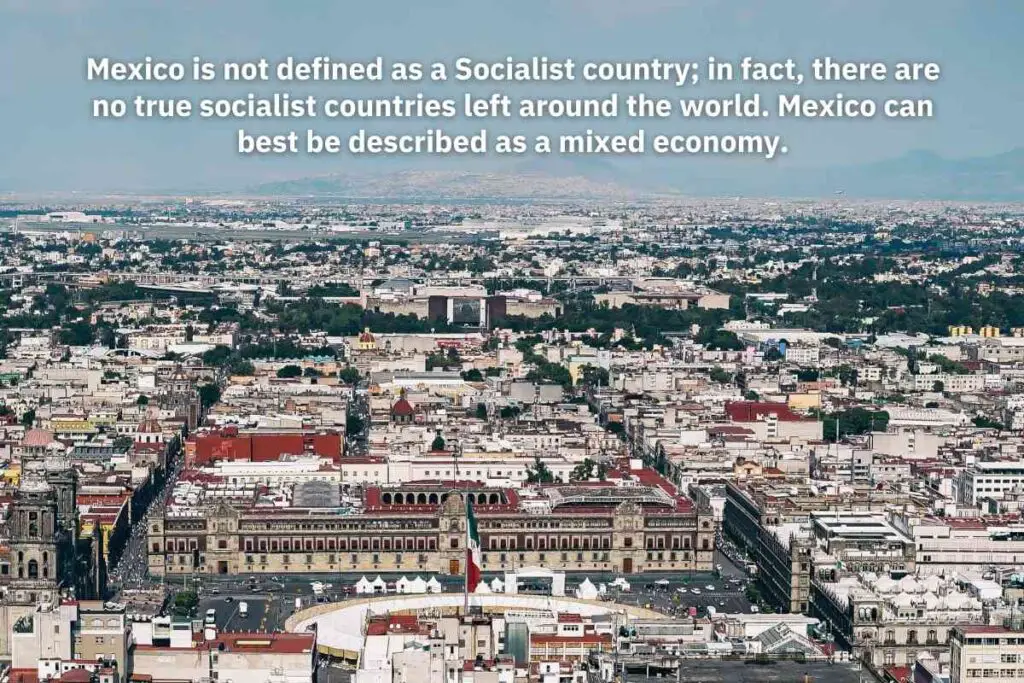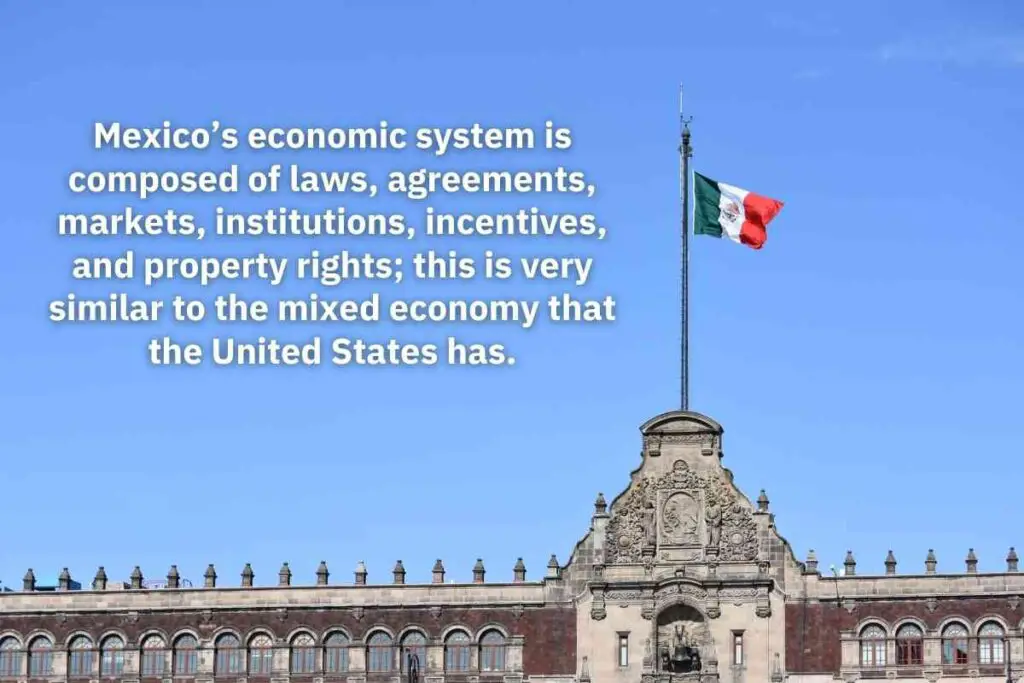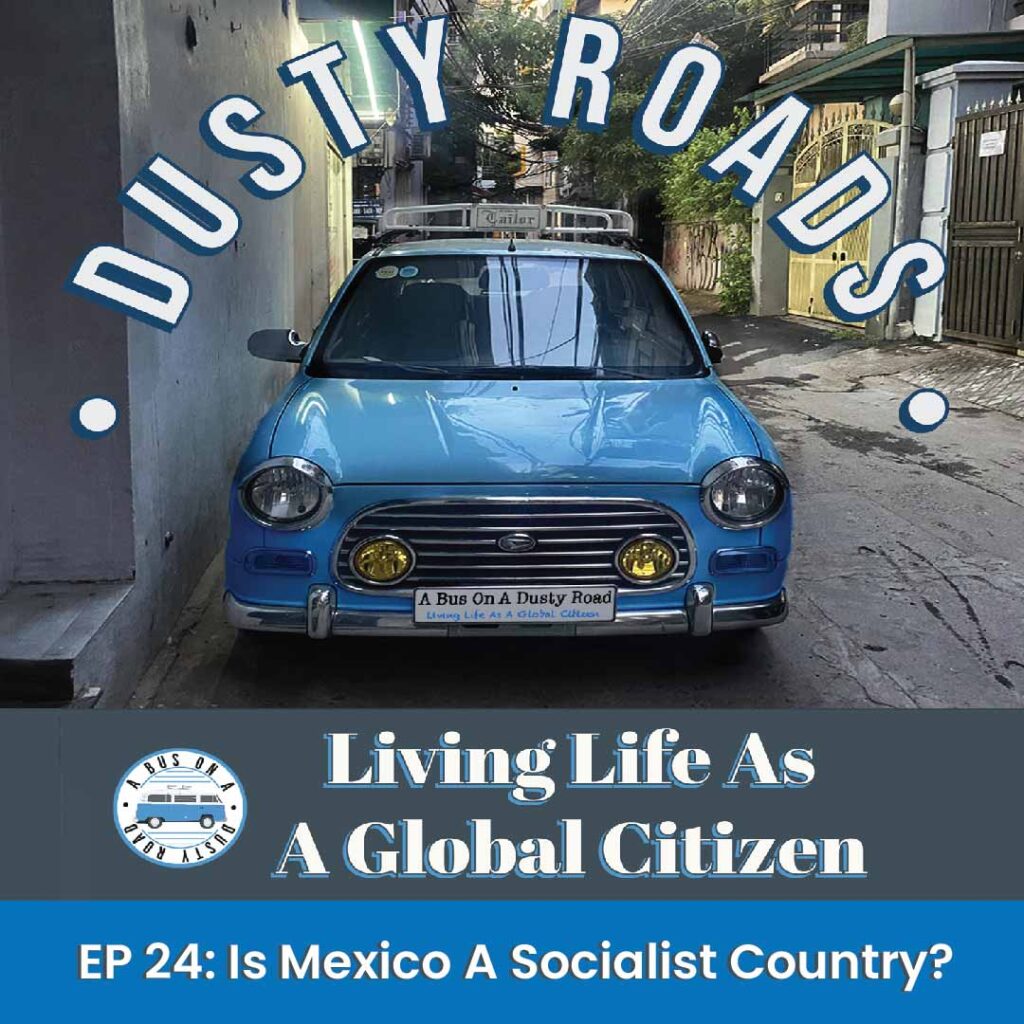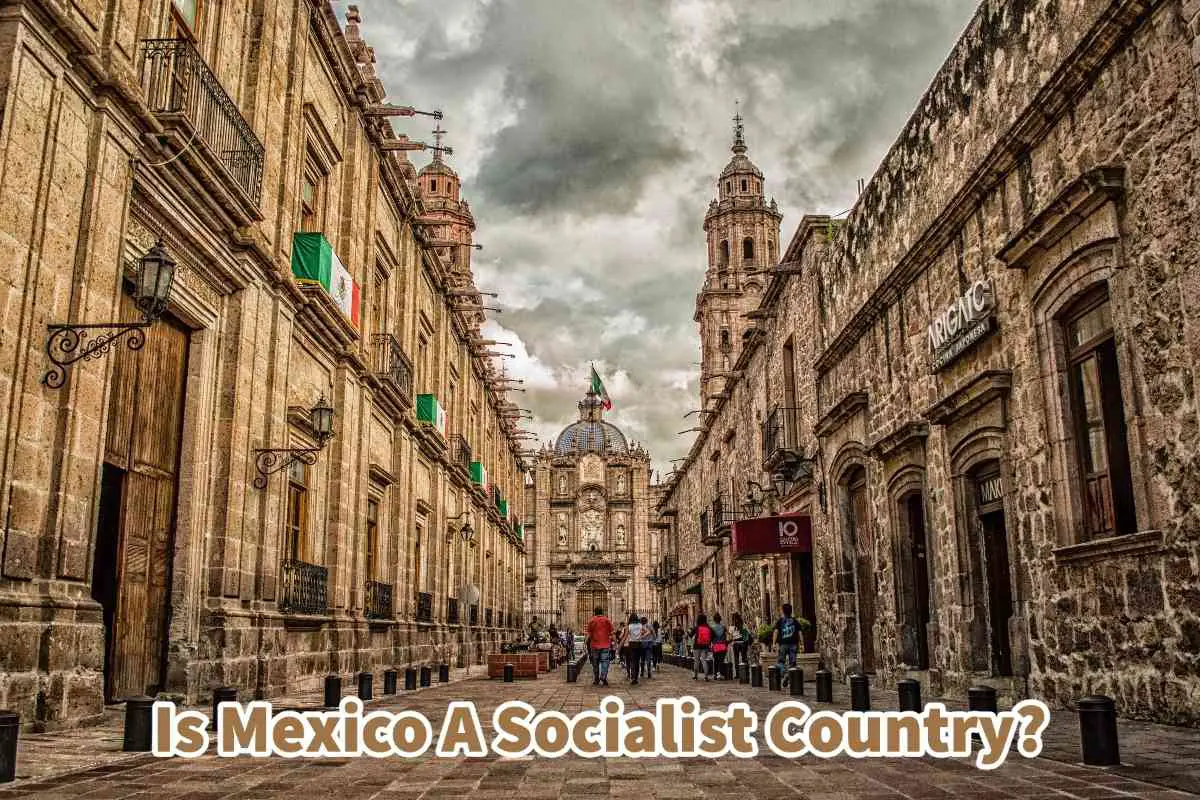Many Americans are unsure what to think of our southern neighbors, who we know as Mexico. One question that many people want to know is if Mexico is a truly socialist country.
Mexico is not a truly socialist country but is known to have a mixed economy, which means that Mexico has both capitalist and socialist characteristics and tendencies. Mexico is a mixed economy as both capitalism and socialism can work together. One of the significant issues with the Mexican system is their government regulations, and their rule of law can be hampered by corruption. The levels of corruption can differ from state to state and area to area, but it can hurt Mexico’s foreign investment, business, and economic environment.
Table of Contents
- Mexico Is Not A Socialist Country
- Mexico’s Ranking Of Economic Freedom
- Mexico’s Ranking Of Capitalism And Socialism
- Frequently Asked Questions
- Related Questions
Mexico Is Not A Socialist Country

Mexico is not defined as a Socialist country; in fact, no true socialist countries are left around the world. Mexico can best be described as a mixed economy.
Mexico’s mixed economy shows characteristics of both capitalism and socialism. Mexico’s private sector allows individuals and companies to decide for their business interests.
Mexico also has a public sector where the state will decide how to produce and distribute goods and services for the public interest. In a mixed economy, the private and public economic characteristics can co-exist; Mexico’s economic system is based on a mixed economy.
Investopedia defines a mixed economy best when it says:
“A mixed economy is an economy organized with some free-market elements and some socialistic elements, which lies on a continuum somewhere between pure capitalism and pure socialism.”
Investopedia
Investopedia said it best when they spoke about the elements of capitalism and socialism in a mixed economy; this clearly defines the Mexican economy.
In Mexico, capitalism and socialism can work together; one does not dominate the other.
The Constitution regulates Mexico’s economy; the rule of economic activities is regulated through laws in the Mexican constitution that define the rights of the public, private, and society. An example of this is that the Mexican Constitution regulates personal property.

Mexico’s economic system is composed of laws, agreements, markets, institutions, incentives, and property rights; this is very similar to the mixed economy of the United States.
Mexico’s Ranking Of Economic Freedom
Under the Heritage Index of economic freedom, Mexico is ranked about 67th globally regarding economic freedom. Mexico’s ranking of economic freedoms is part of the Heritage Economic Freedom study.
The Heritage study looks at four primary areas of freedom for each country that is defined as the following:
- Rule Of Law – The rule of law includes property rights, judicial effectiveness, and government integrity.
- Government Size – The size factor includes tax burden, government spending, and fiscal health.
- Regulatory Efficiency – Regulatory efficiency factors include business, labor, and monetary freedom.
- Open Markets – Market factors include trade, investment, and financial freedom.
Listen To Our Podcast About Is Mexico A Socialist Country? below or by clicking here.

Mexico’s Ranking Of Capitalism And Socialism
The Heritage Economic Freedom factor is essential to understanding how Mexico is viewed for key freedom indicators. Several factors will affect Mexico’s ranking factors of Capitalism and Socialism; these ranking economic ranking factors affect Mexico’s mixed economy.
Below are some of the different economic factors and how they affect Mexico’s capitalism, socialism, and freedom.
Mexico’s Rule of Law
Mexico’s rule of law has to do with property rights. Under Mexican law, property rights are protected, but the way property rights are enforced is very uneven; property registration can also be problematic. Foreign ownership of land is also limited.
The Judiciary in Mexico is independent, but the court decisions are often considered suspect and do not follow the rule of law. Corruption also flourishes in Mexico, so the rule of law is weak.
Mexico is also known for many drug cartels that can affect the rule of law and a capitalist economy.
Mexico’s Government Size And Taxes
Mexico’s top individual income tax rate is 35 percent, and the highest corporate tax rate is 30 percent. There are also many other taxes, such as VAT or value-added tax.
These taxes mean the average individual pays about 16.5 percent of the domestic income to help the Mexican government.
The Mexican government is supposed to use the tax for the public good, but one of the issues is that not all the money is used for social programs, and a lot of the tax money goes to corruption.
Mexico’s Regulatory Efficiency
Mexico’s government is known for having sudden regulatory changes to policy; all these government changes add to a climate of business uncertainty. Mexico also has questionable enforcement of different policies that affect business and capitalism.
Some states of Mexico have been phasing in some labor courts; the problem is that corruption is still an issue in many parts of Mexico.
Mexico has increased subsidies to the state’s utility and oil companies.
Mexico’s Open Markets And Trade
Mexico has about 23 preferential trade agreements in force: Mexico wants to encourage free trade and open trade within a capitalist system.
Even though Mexico wants to attract and encourage foreign investment, this is hampered by the inconsistent rule of law and corruption at many levels.
Mexico is very much a mixed economy, as it has both capitalist and socialist characteristics.
At A Bus On A Dusty Road, we talk about everything about history, travel, life, sailing, and ex-pat living. We are all about “Living Life As A Global Citizen.” We explore social, cultural, and economic issues and travel.
We would love to have you be part of our community. Sign up for our newsletter to keep up-to-date by clicking here. If you have any questions, you can contact me, Anita, by clicking here.
Listen to our Podcast called Dusty Roads. You can find it on all major podcast platforms. Try out listening to one of our podcasts by clicking here.
Subscribe to our A Bus On A Dusty Road YouTube Channel with great videos and information.
Frequently Asked Questions
What is socialism?
Socialism is a political and economic system in which the means of production, distribution, and exchange are owned and controlled by the state or by the people collectively.
What is the political system of Mexico?
Mexico is a federal presidential representative democratic republic, which means that power is divided between the federal government and the state governments, and that the president is both the head of state and the head of government.
What is the economic system of Mexico?
Mexico has a mixed economy, which means that it is a combination of private enterprise and government intervention
What are some of the major industries in Mexico?
Some of the major industries in Mexico include automotive manufacturing, tourism, and oil and gas
Is Mexico a member of any international organizations?
Yes, Mexico is a member of many international organizations, including the United Nations, the World Trade Organization, and the Organization of American States.
How does Mexico compare to other Latin American countries in terms of politics and economics?
Mexico is one of the largest and most influential countries in Latin America, with a diverse economy and a complex political landscape. Its economic and political situation is unique, and it cannot be easily compared to other countries in the region
What is the relationship between Mexico and the United States?
Mexico and the United States have a complex relationship that is heavily influenced by trade, immigration, and security issues.
Is Mexico a socialist country?
No, Mexico is not a socialist country.
Related Questions
Is It True America Is Both Capitalist And Socialist?
America is considered both a capitalist and socialist economy; America is deemed to have a mixed economy which means it has both capitalist and socialist characteristics. Having a mixed economy is essential because there are some things that we need the government to intervene with for the public good.
By clicking here, you can discover Is It True America Is Both Capitalist And Socialist?
Could America Have Won The Vietnam War?
America could not have won the Vietnam war as it never won the hearts and minds of the Vietnamese people. The Americans even had difficulty controlling the Vietnamese people in Southern Vietnam, as many were disillusioned with the Southern Vietnamese government. Ho Chi Minh, the leader of North Vietnam, fully understood that another foreign power would not control the Vietnamese heart and soul.
By clicking here, you can discover Could America Have Won The Vietnam War?
Is Singapore A Socialist Or Capitalist Country?
Singapore has characteristics of both a socialist and capitalist country, so they are known to have called a mixed economic system. They are also ranked number one in the world for freedom. Singapore has also been an extremely successful country that is free and wealthy.
By clicking here, you can discover Could America Have Won The Vietnam War?


